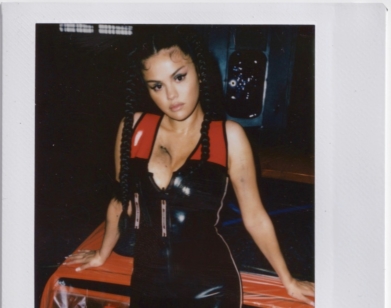Selena Gomez and Amy Schumer Discuss the Stuff That Matters (And Some Stuff That Doesn’t)
Selena Gomez has lived lifetimes. At just 27 years old, she is, in no particular order, a global pop star with three number-one albums, the fifth-most-followed person on Instagram, an actor since the age of 7, an executive producer of documentaries and television, a tabloid fixation, a philanthropist, a mental health advocate, and, most recently, the founder of an inclusive beauty line. She is also a survivor of lupus, the autoimmune disorder she was diagnosed with in 2013, which required her to undergo a kidney transplant in 2017. It’s been so much to place on the shoulders of a girl from Grand Prairie, Texas, that there were questions of whether she could emerge unscathed. The answer, it turns out, is an emphatic yes. After a publicized struggle with anxiety and depression, and the treatment that ensued, Gomez returned to the public eye last year with “Lose You to Love Me,” a self-empowerment anthem that alchemized personal crisis into public catharsis. The song, her first to top the Billboard charts, was the lead single off Rare, an intimate dance-floor confessional that turns vulnerability into strength, and failure into triumph. As Gomez tells her friend, the comedian Amy Schumer, she’s going to be okay
———
AMY SCHUMER: What did you have for breakfast?
SELENA GOMEZ: I had Chinese food from last night.
SCHUMER: I did, too. Dumplings. It’s a really bad way to start the day.
GOMEZ: I was going to attempt to do Zumba later, but that’s not happening.
SCHUMER: Listen to your body. I listen to mine and every day it tells me not to do Zumba. I want to be really careful in this interview, because you have such a magnifying glass on you. You can’t cough without it being trending news.
GOMEZ: The sad part is that I don’t remember a time when that wasn’t the case. What has kept me afloat is that I know eventually it’ll be someone else—and I don’t mean that in a negative way. Sometimes it’s been bad for my career, but other times it’s like, “Now I can talk about things like my depression and anxiety, things that I’ve struggled with and which I’m totally open about, because I believe in seeking help.” But other than that, what keeps me grounded is that I do my best to avoid it. It’s not like I don’t live my life.
SCHUMER: I think I have about ten million followers on Instagram. What I experience, you experience ten or twenty times as much. What has motivated you to share, with so many people watching, all the personal parts of your life?
GOMEZ: My intention was never to become a tabloid. So when things kind of happened that way, it got out of control. And then I was like, “Wait, none of this is true.” The way the media has sometimes tried to explain things has made it sound really bad, when in reality there’s nothing wrong with the fact that I needed to go away or that I fell in love. I had to start opening up because people were taking away my narrative and it was killing me. I’m so young andI’m going to keep changing, and no one has the right to tell me how my life’s going.
SCHUMER: I really loved 13 Reasons Why, which you produced. There’s such a parallel there, because, yes, you’re such a famous person—but to the girl who gets lied about and bullied in high school, it feels just as big.
GOMEZ: That’s why it frustrates me. I read on the news that an 11-year-old boy took his life because a girl was messing with him online. I don’t want to live in a world where that’s happening. It doesn’t matter what scale it’s on.
SCHUMER: You’ve already helped a lot of people, especially younger people, with understanding their own mental health issues. Do you feel like that’s your calling?
GOMEZ: I don’t know if that was ever meant to be my role, but I love people. I care, a lot. I’ve gone through a lot of medical issues, and I know that I can reach people who are going through similarly scary things—an organ transplant, or being on dialysis, or going away for treatment. A huge part of why I have a platform is to help people. That’s why I think I’m okay with the magnitude. I mean, I’m not really okay with it—but I’m going to say that I am because it’s worth it. I know that I’m making someone somewhere feel good, or feel understood or heard, and that’s worth it for me.
SCHUMER: What do you want people to know about lupus?
GOMEZ: I’ve worked with the Lupus Research Alliance for a few years, and basically there are different types of autoimmune diseases. Some people with lupus have physical effects, and those are more noticeable. But I had no idea that I had it. There were no physical signs of it. And when I was 16, my blood pressure was at a level that doctors said I should have had as troke. They put me in the hospital because they couldn’t figure out why my blood pressure was so high. Some people need to get transplants because of it, and it’s something that isn’t talked about a lot. I’m extremely honored to be a part of that community and to find ways that are safer for people to get treatment, or to make it easier to detect quicker.

Tank Top by Vanna Youngstein. Skirt by Moschino Couture.
SCHUMER: I love your new album. I’ve been listening to it with the baby. I listen to it when I’m doing a post-IBS elder workout, and it’s really interesting to me that it would be classified as pop music, because it’s about such heavy stuff. What’s it like to combine the intention with the genre?
GOMEZ: I wanted to make sure, especially on this album, that each song meant something to me, that it represented a story that actually happened to me or one that I’m still walking through.
SCHUMER: The song “Lose You to Love Me”—I think a lot of people relate to that exact story. Do you remember the moment when you made that realization of getting yourself back?
GOMEZ: I do. I wrote it at the beginning of last year, and had just gotten out of treatment. It was a moment when I came back and I was like, “I’m ready to go into the studio with people I trust and start working on songs.” There was an air around it where people were very happy, because it was like I was going to finally be me. But I didn’t necessarily see it that way at the time. When I wrote the song, I was basically saying that I needed to hit rock-bottom to understand that there was this huge veil over my face.
SCHUMER: This is your third number one album. Does that sound funny to you?
GOMEZ: It’s so weird, it almost didn’t occur to me. My mom is one of the most incredible people in the world—I give her credit for everything. She would always say things to me like, “If you didn’t get the part, that’s because it was meant for someone else, and you should be happy for them. Yours will come.” She raised me to have that mentality. Wait, what was the question?
SCHUMER: I was just talking about the accomplishment of having several number-one albums.
GOMEZ: Right. It’s not that I forgot the other two. It’s just that in my mind, I don’t sit there and tally it all.
SCHUMER: As a woman, it’s unacceptable for you to brag about it or not be humble about it. But men are encouraged to do that. Critics really love this album. Do you read reviews and do they affect you?
GOMEZ: I’ve read a few, especially because I hadn’t released an album in five years. My friend sent me a couple of good reviews, and it felt amazing, because not all of my albums have been seen that way. I didn’t go beyond that because I know what happens to me. Getting into an internet spiral? I can’t do it.
SCHUMER: I can take the subway and get coffee and maybe some people say hi to me, but I’ve never been mobbed—except at this one bat mitzvah. But when I’m out in the world, if I have a comedy special that’s out that people really like, I can feel the energy on the street. This album is really successful. Can you feel it?
- Tank Top by ERL. Pants by Balenciaga.
- Tank Top by ERL. Pants by Balenciaga. Safety Pin by Moschino Couture.
GOMEZ: I’m very, very happy. And it’s sometimes hard for me to be happy for myself.
SCHUMER: Why?
GOMEZ: I don’t know. I’ve been talking about it with some people.
SCHUMER: Trying to figure it out.
GOMEZ: And I’m sure I will. I think there’s always something in me that’s like, “What’s the next thing?” My mind is a battlefield.
SCHUMER: For me, it’s about doing all the work leading up to the thing. It’s nice if people like it, but I really enjoy doing the work. You also seem like someone who enjoys putting the work in more than what comes after.
GOMEZ: When I’m recording the album, I feel safe. I’m in a bubble, working on things I have full control over. Or if I’m on a set, we’re all just kind of isolated together. That’s definitely what I enjoy. And now that it’s out, I do think it’s been different. I feel likeI’ve gotten an older audience because of “Lose You to Love Me.”
SCHUMER: Millions of people have so much love for you, and when someone meets you, they can see your kindness and your intelligence and your vulnerability. I think people worry about you. I’ve worried about you. Should we be worried about you?
GOMEZ: No. I’ve gone through some really difficult stuff, and because of those moments, whether I liked it or not, a picture was painted of my life. That was scary because I didn’t want it to affect my career.
SCHUMER: You didn’t want what to affect your career? Your personal life?
GOMEZ: Yeah. It got out of control when I was super young. I think it showed people that I was weak in certain moments, and that I had troubles. Some people just get off on building people up and then trying to bring them down.
SCHUMER: I’ve never witnessed any backlash to you. When you say weaknesses, I don’t even know what you’re talking about.
GOMEZ: I guess what I mean is that people worry about me because I’ve had some trouble in the past. And it’s kind, it is. But I’m okay. I deal with what I deal with, and if I feel like I’m having a rough week or I’m not up to doing something, I don’t do it.
SCHUMER: When I look at the stuff you’ve accomplished, I’m so inspired. You produced the docuseries, Living Undocumented, and then you re-released some of your music in Spanish. Why are those two things important to you?
GOMEZ: I love music so much, but there are different stories I want to tell. I knew I would get backlash for doing that series.
SCHUMER: Really?
GOMEZ: Well, yeah, but I want to talk about important things. I want the stupid questions about things that nobody cares about to eventually stop. Ask me questions about stuff that matters.
SCHUMER: Do you think you’ll get involved in the presidential race?
GOMEZ: No, I don’t plan on doing that for another 30 years. [Laughs] But I’m encouraging as many people as possible to vote. It’s something that me and my friends talk about constantly. I’ll be fully on the ground pressuring people to vote.
SCHUMER: Is there a TV show you like?
GOMEZ: I love Succession.
SCHUMER: Did you watch Cheer?
GOMEZ: No, but I remember you telling me I need to.
SCHUMER: What do you and your friends dance to if you’re going hard?
GOMEZ: “I Don’t Fuck With You” by Big Sean. It’s kind of the best song in the world. It actually releases a lot of aggression when you’re singing it. It feels very therapeutic in a dark way.
- Jumpsuit by Marine Serre.
- Dress by Morphew Collection.
SCHUMER: Do you think I’m too old to wear a scrunchie?
GOMEZ: Amy, I don’t think you’re too old to do anything.
SCHUMER: My assistant left a scrunchie here the other day and I put it in my hair and I looked in the mirror and I looked sad. Just be honest with me. If you saw a picture of me in a scrunchie, would you be like, “Oh, that’s sad”?
GOMEZ: First, I’m obsessed with you. Second, I would never think that. Please wear a scrunchie.
SCHUMER: You’re coming out with a makeup line. What’s your relationship to makeup?
GOMEZ: I wanted to start a conversation about how can you make yourself feel great. It’s not necessarily about needing these things to make yourself feel beautiful. People of my generation have all this pressure to look a certain way, and I wanted to make a line that took away a bit of that pressure. I use real people in the campaigns. I have 48 shades of foundation and concealer. It’s all very clean and easy. I wanted people to feel safe.
SCHUMER: Okay, but can you make a mascara that doesn’t clump?
GOMEZ: Yes, I’ll be sure to.
SCHUMER: Will you, please? I seriously can’t find any. Is Kid Cudi tall?
GOMEZ: I think he’s probably three inches taller than me.
SCHUMER: My memory is that you’re not that tall.
GOMEZ: I’m 5’5″. That’s average, right?
SCHUMER: I don’t want to height-shame you, but that’s not tall. What’s your favorite snack that doesn’t make you feel bad about yourself.
GOMEZ: Apples and peanut butter.
SCHUMER: Can I make a quick suggestion? If you put one spoonful of peanut butter and mix it with threes poons of yogurt, and dip your apple in it, it’ll change your whole life. Your mission might be to help with mental health, but mine is to get the word out about this snack.
———
Hair: CHRIS McMILLAN for DRUNK ELEPHANT NYC at CHRIS McMILLAN THE SALON
Makeup: ROMY SOLEIMANI at THE WALL GROUP
Set Design: MICHAEL WANENMACHER for WANENMACHER
Production: KATHLEEN HEFFERNAN at OPERATOR
On-site Production: MEAGAN JUDKINS
Production Manager: SAMANTHA SILVERS
Manicure: MIWA KOBAYASHI
Photography Assistant: THOMAS PATTON
Fashion Assistants: CHRISTINA CORSO, DOMINIC DOPICO, BRITTNY MOORE, and BIN X. NGUYEN.
Tailor: M’LYNN HASS
Hair Assistant: SKEVO ZEMBILLAS















